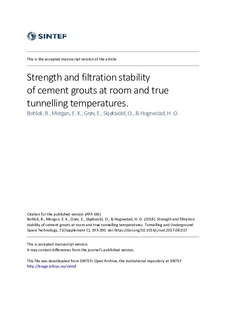| dc.contributor.author | Bohloli, Bahman | |
| dc.contributor.author | Morgan, Elin Katrine | |
| dc.contributor.author | Grøv, Eivind | |
| dc.contributor.author | Skjølsvold, Ola | |
| dc.contributor.author | Hognestad, Hans Olav | |
| dc.date.accessioned | 2017-11-22T07:58:37Z | |
| dc.date.available | 2017-11-22T07:58:37Z | |
| dc.date.created | 2017-09-26T15:03:47Z | |
| dc.date.issued | 2017 | |
| dc.identifier.citation | Tunnelling and Underground Space Technology. 2017, 71 193-200. | nb_NO |
| dc.identifier.issn | 0886-7798 | |
| dc.identifier.uri | http://hdl.handle.net/11250/2467452 | |
| dc.description.abstract | The overall objective of this work, carried out under the research project “True Improvement in Grouting High pressure Technology for tunnelling (TIGHT)” is to understand the behavior of cement grouts under true tunnelling conditions. This paper describes a systematic laboratory study to characterize uniaxial compressive strength (UCS) and filtration stability of grouts made up of three types of cement commonly used for tunnel grouting in the Nordic countries. Since in-situ tunnel conditions are different from those of the laboratory in terms of temperature, we made various cement grouts at different temperatures and tested in the laboratory. The water cement ratios of 0.6, 0.8, 1.0 and 1.2 were used for all three cements and grouts were made and cured at two temperatures; 8 °C and 20 °C. Strength of a total of 96 cylindrical specimens of 4 and 7 days age and permeability of four specimens of 7 days age were measured. Filtration tests were done for 36 cement grouts. Results of the laboratory tests show that strength of samples cured at 8 °C is lower than those cured at 20 °C. Strength of grout specimens decreases dramatically with increasing w/c ratio. Filtration of cement grouts at 8 °C is not that different from those at 20 °C and filtration stability increases with increasing water-cement ratio. Permeability of cylindrical specimens of different types of cement varies several orders of magnitude; from nano- to milli-Darcy. | nb_NO |
| dc.description.sponsorship | Acknowledgement. This paper is a part of the research project True Improvement in Grouting High pressure Technology for tunneling (TIGHT) financed by the Research Council of Norway (project no. 236676/O30), in co-operation with Statens Vegvesen, Jernbaneverket, and industrial part-ners BASF, Mapei, Geovita, LNS, ITS, Normet, Bever Control, AMV and Veidekke. Research partners in TIGHT are NGI, NTNU and SINTEF, whilst KIGAM of Korea and Nanyang University in Singapore together with BeFo of Sweden are associated with TIGHT. | nb_NO |
| dc.language.iso | eng | nb_NO |
| dc.publisher | Elsevier Ltd. | nb_NO |
| dc.rights | Attribution-NonCommercial-NoDerivatives 4.0 Internasjonal | * |
| dc.rights.uri | http://creativecommons.org/licenses/by-nc-nd/4.0/deed.no | * |
| dc.subject | Grouting | nb_NO |
| dc.subject | Tunnelling | nb_NO |
| dc.subject | Filtration stability | nb_NO |
| dc.subject | Strength | nb_NO |
| dc.subject | Permeability | nb_NO |
| dc.title | Strength and filtration stability of cement grouts at room and true tunnelling temperatures | nb_NO |
| dc.type | Journal article | nb_NO |
| dc.type | Peer reviewed | nb_NO |
| dc.description.version | acceptedVersion | nb_NO |
| dc.rights.holder | © 2017 Elsevier B.V. All rights reserved. This is the authors' accepted and refereed manuscript to the article, post-print. Released with a Creative Commons Attribution Non-Commercial No Derivatives License. The final publication is available at https://doi.org/10.1016/j.tust.2017.08.017 | nb_NO |
| dc.subject.nsi | VDP::Technology: 500 | nb_NO |
| dc.source.pagenumber | 193-200 | nb_NO |
| dc.source.volume | 71 | nb_NO |
| dc.source.journal | Tunnelling and Underground Space Technology | nb_NO |
| dc.identifier.doi | 10.1016/j.tust.2017.08.017 | |
| dc.identifier.cristin | 1498438 | |
| dc.relation.project | Norges forskningsråd: 236676 | nb_NO |
| cristin.unitcode | 7401,30,40,0 | |
| cristin.unitname | Arkitektur, byggematerialer og konstruksjoner | |
| cristin.ispublished | true | |
| cristin.fulltext | postprint | |
| cristin.qualitycode | 1 | |

